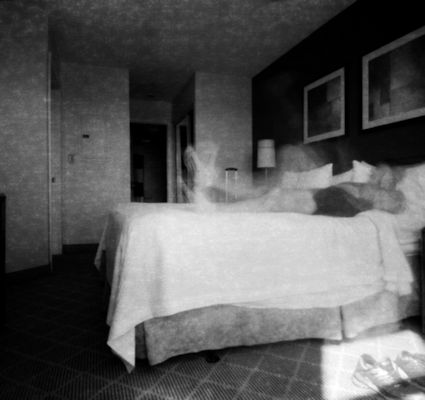
“The world is twofold for man in accordance
with his twofold attitude.”
— Martin Buber, from I and Thou
One thing my grandfather did when he was alive: he wrote commentaries on the Bible. Another thing he did was fall asleep sitting up in a chair. Sometimes these two activities would blur and blend, and, inside the clean walls of his whitewashed office, he would drift off with his hands on the keys of his typewriter, in the middle of some holy thought.
Sometimes it amazes me that we can love a person just as much when they are sleeping as when they’re awake—that our love in no way diminishes because of that temporary absence.
As a teenager, I’d sometimes fall asleep while praying—spread out across my twin bed while church music played through blue speakers.
At church camp we’d been told that falling asleep while praying was a sin, that it was disrespectful toward God. I suspected at the time that this was dead wrong, that sleep is probably the holiest thing any human being is capable of, but I still felt a twinge of guilt when I woke up, resurfacing from sleep with drool coating my cheek, the cassette tape unspooling slowly, marking its end with the stiff click of the play button releasing. And, wiping the saliva off my face with the back of my hand, I used to breathe a word or two of apology: “Sorry, God,” and immediately the spell of prayer, the spell of sleep, would be broken, and I’d feel that I was talking to no one, nothing. The “sorry” was ridiculous—the sorry of “I have a human body and you don’t,” the sorry of “I was absent while you were still present” seemed to push everything from it, left me feeling foolish and alone. So I stopped apologizing.
But seeing my grandfather’s head sink onto his chest in the middle of typing up an analysis of Jacob wrestling with the angel, seemed to settle this question once and for all: God loves us while we sleep, wants us to sleep in the midst of him. God holds our place for us, while the exhaustion of our bodies erases us temporarily.
Sleep is, supposedly, gentle. My grandfather, too, was a gentle man. Aside from, perhaps, one story I heard about his days working as an orderly at a mental institution after World War II. One of the patients tried to escape; he was fleeing the grounds because his family had just visited and he wanted to follow them home. Without warning, the man had started running after his family’s car at full speed, and my grandfather had had no choice but to tackle him onto the green lawn in front of the asylum.
We are twofold in our nature—both gentle and ungentle, both asleep and awake.
My grandfather died that way when I was twelve. I mean, he died sitting up in his chair with his hands lightly resting on the keys of his typewriter. I couldn’t tell you the word he was in the middle of typing, but I do know that he was in the midst of writing a commentary on the Book of Acts, the part with those little tongues of flame hovering above everyone’s heads, making the scalp glow white through the parts in their hair.
The world is twofold especially to those of us who have trouble finishing our sentences, who fall asleep in the midst of seeking, who want only to reach a flicker of understanding for what those little flames might’ve looked like, dancing above everyone’s heads in what would’ve otherwise been a dark room. The flames, I imagine, must’ve made their hair smell warm, like sunlight coming in through the open window, like baking bread, like wheat fields just before dusk. Or like the green, living smell of bright grass in my grandfather’s nose when he tackled the man who was only trying to follow the taillights of his wife’s car, who didn’t want to let those two little red pinprick flames leave his sight, receding from him, from him and my grandfather both.
___
Renée Branum recently graduated with an MFA in Creative Nonfiction from the University of Montana. She received an MFA in Fiction from the Iowa Writers’ Workshop in 2013 where she was a Truman Capote Fellow and a recipient of the Prairie Lights Jack Leggett Fiction Prize. Renée’s work has appeared in The Georgia Review, Narrative Magazine, Literary Hub, and elsewhere. Renée currently lives in Cincinnati where she is pursuing a PhD in Fiction Writing.

3 comments
Jan Priddy says:
Sep 19, 2018
I am reading Power of Gentleness by Anne Dufourmantelle, a work of philosophy that is a bit over my head. Your essay shines its own light over these ideas, illuminating a twofold world. What we dream and how we live. Your work inspires and clarifies. Thank you.
Mary Carol Randall says:
Oct 30, 2018
Absolutely lovely. However, I would put a period after “receding from him.”
Judith Keenan says:
Jan 9, 2019
I was a boarder at a Catholic girls school in the 1960’s. We had to go to mass every morning. I could even fall asleep kneeling, and would wake up with a slight jolt, the drool running down my arm onto the pew in front of mine. I thought it was funny.